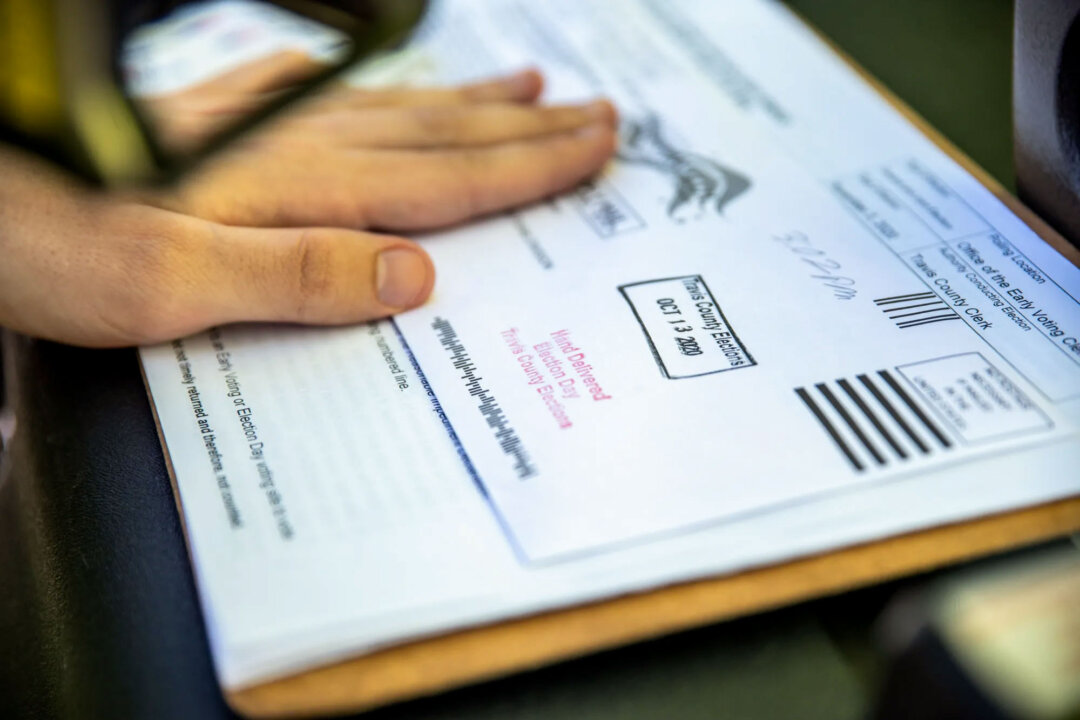The decision reinstates a state law provision that made certain types of paid ballot harvesting a third-degree felony.
A federal appeals court has granted Texas Attorney General Ken Paxton’s request to block a district court ruling that declared part of an election reform bill unconstitutional, allowing the state to continue investigating alleged cases of illegal vote harvesting.
In a decision on Oct. 15, the Fifth Circuit Court of Appeals issued a stay of the district court’s Sept. 28 ruling, which had halted enforcement of certain sections of Senate Bill 1 (S.B. 1). According to state officials, the 2021 state law was designed to combat voter fraud and bolster election integrity.
Specifically, the lower court had struck down a provision that made certain types of paid ballot harvesting a third-degree felony, finding it violated the First and Fourteenth Amendments by being overly vague and infringing on free speech.
Paxton appealed the district court ruling, calling it “unacceptable” and saying that it would impede the state’s ability to safeguard its elections.
“A ruling—weeks prior to an election—preventing my office from investigating potential election violations is deeply troubling and risks undermining public trust in our political process,” Paxton said in a Sept. 30 statement.
The Fifth Circuit initially sided with the attorney general on Oct. 4 by granting a temporary stay on the lower court’s order until Oct. 10. Then, on Oct. 15, the appeals court extended that stay indefinitely, allowing the state to enforce the provisions of S.B. 1 as the legal battle continues.
The appeals court found that the plaintiffs—including the League of United Latin American Citizens (LULAC) and the League of Women Voters of Texas—failed to meet the high legal standard required to block an election law just weeks before the general election. The court noted that the plaintiffs’ constitutional challenge to the anti-vote harvesting provision was “far from ‘entirely clearcut,’” casting doubt on their likelihood of success.
The Fifth Circuit said that the plaintiffs’ arguments, which asserted that the law was too vague and infringed on free speech, lacked sufficient merit to justify the district court’s injunction, particularly given the proximity of Election Day. The court said that the anti-vote harvesting provision had been in place for over three years without being successfully challenged and that last-minute changes to election laws could create confusion for voters as well as election officials.
“On the eve of elections in Texas, the district court has entered an injunction that impacts how ballots can be handled,” Circuit Judge James C. Ho wrote in the Oct. 15 order. “It holds unconstitutional a law that has been on the books for over three years but that the court did not see fit to enjoin until now.”
Circuit Judge Irma Carrillo Ramirez concurred, stating that issuing a stay was consistent with both Supreme Court and Fifth Circuit precedent due to the risk of disrupting the voting process so close to Election Day.
A request for comment from LULAC and the League of Women Voters regarding the appeals court’s latest decision was not immediately returned.
LULAC had celebrated the district court’s original Sept. 28 ruling as a victory for voter rights.
“The decision strikes down as unconstitutional a main TX statute that was used to try to intimidate Hispanic organizers & voters,” LULAC wrote in a series of posts on social media platform X on Sept. 28. “For too long, certain politicians have used false claims to push abusive laws like this in campaigns of intimidation, and today’s decision blows a hole in those campaigns.”
S.B. 1, signed into law by Texas Gov. Greg Abbott in 2021, introduced sweeping changes to the state’s election laws. One of the changes was the anti-vote harvesting provision, known as the canvassing restriction, which made it a third-degree felony for individuals to earn “compensation or other benefit” in exchange for assisting voters with mail-in ballots. The restriction targeted activities like door-to-door canvassing and providing voting assistance at public events where mail-in ballots are present if any form of compensation—such as transportation or meals—was involved.
In addition to the canvassing restriction, the law introduced stricter ID requirements for mail-in voting, imposed limits on early voting hours, and restricted drive-through voting. Supporters, including Abbott, argued the law was necessary to prevent voter fraud, with Republican state Sen. Bryan Hughes, the bill’s author, calling it a measure that makes it “easy to vote and hard to cheat.”
The law was met with strong opposition from Democrats and civil rights organizations, who argued that it disproportionately harmed minority, disabled, and elderly voters. Legal challenges have been filed against various provisions of the law, with critics arguing that it violates federal voting protections.
While the district court’s Sept. 28 ruling temporarily blocked the anti-vote harvesting provision, the appeals court’s Oct. 15 order reinstates it for the time being, meaning that all provisions of S.B. 1 remain in force as Texas prepares for the coming election.

